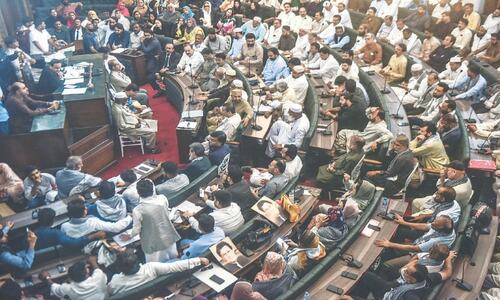WASHINGTON: Banning weapons will not end the nuclear race, says a senior US official while pointing out that both India and Pakistan are adding to their atomic arsenals.
These remarks by US Assistant Secretary of State for Arms Control Frank A. Rose coincided with a Washington Post report that the Obama administration was considering various options to end the nuclear race in South Asia.
According to the report, the United States appears willing to offer the same nuclear deal that it offered to India a few years ago. The deal allowed New Delhi to mainstream its nuclear programme. In return for the deal, Pakistan will have to accept certain restrictions on its programme.
At a recent seminar at Kings College, London, Assistant Secretary Rose clubbed India and Pakistan with North Korea and Iran in a reference to nations that were expanding their nuclear weapons capabilities.
“Some want to oversimplify this task by suggesting all we need to do is ban nuclear weapons. That ignores today’s complicated reality,” said Mr Rose.
“Russia and China are modernising their nuclear forces; India and Pakistan are adding to their arsenals; North Korea’s nuclear and missile programmes remain a concern to all; and Iran, despite the landmark nuclear deal, continues its ballistic missile programmes,” he said.
While acknowledging that banning weapons will not end nuclear proliferation, Mr Rose said: “We must consider how we effectively deter multiple adversaries with varying capabilities.”
Diplomatic observers in Washington argue that the US-India deal, which allowed New Delhi to join the Nuclear Suppliers Group, should also be reviewed in this context.
They say that there is a realisation in Washington that they will have to reconsider their policy towards Pakistan as well because banning its nuclear programme may not succeed in persuading Islamabad to give up its weapons.
David Ignatius, who wrote the article indicating a new thought pattern in Washington for dealing with Pakistan, said that it would be a long process.
“What’s happening now is a very preliminary discussion of what would be a long and difficult negotiation, and I have to say that it’s a long shot,” he told Dawn.
“Dawn readers should not assume this will happen next month or next year … but this is precisely the kind of issue that the US and Pakistan should be discussing,” he added.
In his piece for the Post, Mr Ignatius indicated that the issue might also be discussed during Prime Minister Nawaz Sharif’s visit to Washington next week.
Assistant Secretary Frank Rose also underlined the difficulties that the US faced in achieving its target for a nuclear-free world.
“Achieving a world without nuclear weapons will be a difficult, painstaking process, undertaken over many years,” he said. “Future arms control success will require creativity, patience and persistence.”
Published in Dawn, October 13th, 2015
On a mobile phone? Get the Dawn Mobile App: Apple Store | Google Play











































